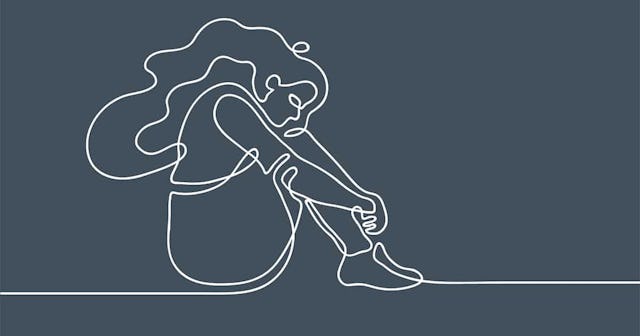This Is Why I Write About My Grief

There was a moment, a few summers ago — the summer after my young husband died, to be exact — when my children asked me to go into the pool with them. The other moms were sitting by the pool and the dads were in the water, throwing their kids into the deep end. Those kids were shrieking and laughing. The dads traded sports talk in between throws.
I slipped into the water, unnoticed at first, and then to exclamations of surprise from the other adults because I never, really never, go in the water. I was hit with grief pang one: a reminder that my old life—the life where I could sit with the moms and call out for my husband to be careful when he threw my youngest—was gone. I was in the cold water. The life I lost was sitting poolside.
My kids swarmed to me, desperate for attention and affection and distraction. Grief pang two: watching those two sweet, grieving children watch all their friends enjoy the thing they wanted the most in the world and the thing they would never again have. Their dad.
I picked up my youngest and threw. I picked up my oldest and threw. To say throw is to be generous. I kind of just lifted a few inches and pushed them across the water. They got no air time, and both made it about four inches. Grief pang three: a stark visual that I’m just not as strong as he was.
After a few more feeble attempts that at least made my kids giggle, the other kids moved on to a different game and my kids did, too. I made my way to the edge of the pool, hoisted myself out, found a towel and dried off, and sat with grief pang four: the loneliness that always swallows me when I realize how much unspoken grief was filled into those few minutes of giggling pool time with my kids.
Those grief pangs, and that loneliness, are why I write about my grief. They are why I write about my grief often, and publicly.
Back in the time before—before my husband was diagnosed with brain cancer and before my children lost him in mind and then body, before he died and everything that was and should have been crumbled—I didn’t understand grief. I thought grief was crying at the funeral, and wearing black for a few days after, and then maybe being sad again on the big dates. I didn’t know grief was laughing on a sunny summer day in the pool with the kids.
I didn’t realize grief was a constant, a shadow that becomes part of your life, a part of every moment. Then I didn’t know that the shadow of grief ebbed and flowed in size and density, but never left. I didn’t know that I would never be the same. And I didn’t know there’s something lonely in having this knowledge that so many don’t have, and will only acquire when they lose someone so relevant to their lives that everything that was and should have been crumbles.
When I started writing about my grief, my grief was raw. The words spilled out of me. My social circle probably wasn’t surprised to see my grief on their social media feeds. I’m a writer who’d just lost her husband. Of course I’d take to the written word. But years later, I’m still writing about my grief often and publicly. And now, sometimes, before I press publish on a post, I pause. There’s a hesitation that wasn’t there early on, and I can’t help but to ask myself why I’m writing.
The answer is never for sympathy. Or for attention. Both sometimes flow from a post, and I feel guilty reading the comments that say “thinking of you” or the text messages that pour in. I appreciate them, but I didn’t write about grief in some roundabout way to solicit sympathy, or to paint a giant, metaphorical neon arrow asking everyone to remember my loss.
No, I write about grief for another reason. Two reasons, really. One, because I want to keep my husband’s memory alive. Writing about him—what was and what might have been—lets me keep him beside me for a just a little longer. And that’s all I want: just a little longer, a little more time, with him. And two, because grief, the way it doesn’t end after the mourning period and the way it changes and infiltrates every moment, is misunderstood by our culture. And mostly because there’s something infinitely lonely about sitting on a pool deck, on a sun soaked day, being pricked by pangs of grief only you can feel.
Once upon a time, I didn’t understand grief. I didn’t know that grief wasn’t a fleeting feeling, like hunger or anger. I didn’t know that grief changes you on a soul level, the way falling in love changes you, the way becoming a parent changes you.
But now I know, and I write about grief to normalize that truth. To make it okay to feel forever changed. To hopefully make it okay to live and laugh in moments and also wince against the pangs of grief, and to speak those pangs out loud—not for sympathy or attention, but because it’s nice to be heard, to feel a little less alone.
I write about grief years after my loss because sometimes we all want to know we’re not alone, and someone somewhere understands our story.
This article was originally published on